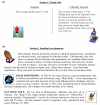Development of a culturally targeted smoking cessation intervention for African American smokers
- PMID: 19728056
- PMCID: PMC3712791
- DOI: 10.1007/s10900-009-9181-5
Development of a culturally targeted smoking cessation intervention for African American smokers
Abstract
In this paper we describe the development a culturally targeted (CT) smoking cessation intervention for low-to-middle income African-American smokers. Based on theoretically based guidelines, modifications were made to a standard treatment manual for group-based smoking cessation counseling that incorporates cognitive-behavioral, motivational, and twelve step skills. Approximately 41% of the standard treatment materials were modified, and four new modules were developed. A pilot study was conducted to compare acceptability, feasibility and early outcome indicates in African American smokers randomized to the CT intervention compared with existing data from African American smokers treated using a non-targeted standard approach (ST). Outcomes from the CT pilot study were promising: results showed high levels of feasibility, acceptability and better adherence to nicotine replacement therapy, higher quit rates, and better retention and follow-up compared with the ST. Findings suggest that a culturally targeted and intensive group based smoking cessation treatment is plausibly effective in improving smoking cessation outcomes in African American smokers, warranting a larger randomized trial.
Figures


References
-
- Centers for Disease Control and Prevention Tobacco use among adults—U.S., 2005. Morbidity and Mortality Weekly Report. 2005;42(42):1145.
-
- Audrain J, Gomez-Caminero A, Robertson AR, Boyd R, Orleans CT, Lerman C. Gender and ethnic differences in readiness to change smoking behavior. Womens Health. 1997;3(2):139–150. - PubMed
-
- U.S. Department of Health, Human Services . The health benefits of smoking cessation. U.S. Department of Health and Human Service, Public Health Service Centers for Chronic Disease Prevention and Health Promotion Office on Smoking and Health; Rockville, MD: 1990.
-
- Fiore MC, Novotny TE, Pierce JP, Hatziandreu EJ, Patel KM, Davis RM. Trends in cigarette smoking in the United States. The changing influence of gender and race. Journal of the American Medical Association. 1989;261(1):49–55. - PubMed
-
- Giovino GA, Schooley MW, Zhu BP, et al. Surveillance for selected tobacco-use behaviors–United States, 1900–1994. Morbidity and mortality weekly report. CDC surveillance summaries/Centers for Disease Control. 1994;43(3):1–43. - PubMed
Publication types
MeSH terms
Grants and funding
LinkOut - more resources
Full Text Sources
Medical

